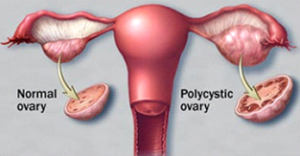Polycystic ovary syndrome (PCOS) is also termed as Stein-Leventhal syndrome. It is a problem where woman’s hormones are out of balance and it can cause problems with periods and make it difficult to get pregnant. PCOS causes unwanted changes. If it not treated on time, it leads to serious health problems, such as diabetes and heart disease.
 Mostly, women with polycystic ovary syndrome will undergo small cysts on their ovaries. That is why it is called polycystic ovary syndrome. The cysts which are grown are not harmful but can lead to hormone imbalances. Early diagnosis and treatment of PCOS will help to control the symptoms and also prevents long-term problems.
Mostly, women with polycystic ovary syndrome will undergo small cysts on their ovaries. That is why it is called polycystic ovary syndrome. The cysts which are grown are not harmful but can lead to hormone imbalances. Early diagnosis and treatment of PCOS will help to control the symptoms and also prevents long-term problems.
Hormones are chemical messengers which triggers many different processes, including growth and energy production. The work of one hormone is to signal the release of another hormone.
The origin of PCOS is not fully understood, but genetics may play a major role. The factors that contribute the polycystic ovary syndrome are excess insulin, low grade inflammation and heredity where the PCOS seems to run in families, so the chance of having it is higher if other women in the same family have it or having irregular periods or diabetes. PCOS can be occurred by maternal inheritance.
Symptoms tends to be mild at first. The most common symptoms are:
- Acne
- Weight gain and trouble losing weight.
- Extra hair on the face and body. Often women get thicker and darker facial hair and more hair on the chest, belly, and back.
- Thinning hair on the scalp.
- Irregular periods. Women with PCOS have fewer than nine periods a year. Some women have no periods. Others will have very heavy bleeding.
- Fertility problems. Many women who have PCOS leads to infertility.
- Depression
Hormone imbalances can cause numerous types of pregnancy problems and related problems, including:
- Infertility
- Gestational diabetes during pregnancy.
- Precancer of the uterine lining – endometrial hyperplasia
- Uterine (endometrial) cancer
- Increased blood pressure during pregnancy or delivery
